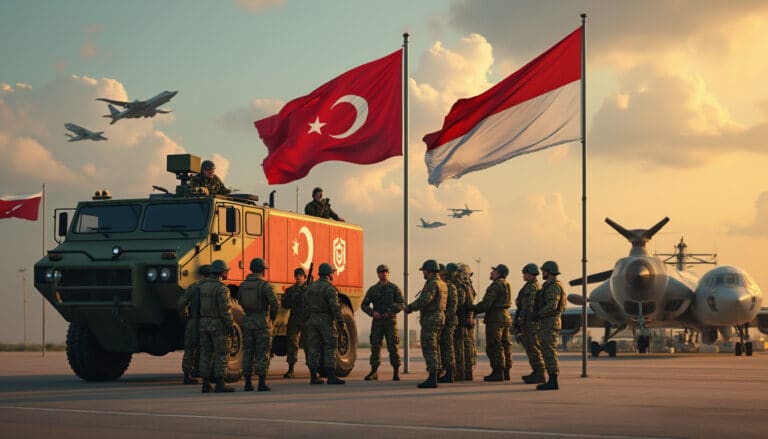A new era of defense is on the horizon. Turkey is expanding its military influence internationally. Indonesia becomes the first foreign partner to adopt the Khan missile system.
The contract signed between Roketsan and Indonesia marks a major milestone in bilateral military cooperation. The Khan missile, the exported version of the proven Bora system, offers an impressive range of 280 kilometers. Additionally, a multi-layered air defense system will also be deployed to meet the specific needs of the Indonesian army. This collaboration paves the way for future initiatives in the Southeast Asian region.
Table des matières
ToggleIndonesia, the first nation to adopt Turkey’s Khan missile system
Turkey takes a major step in the defense sector by signing a historic agreement with Indonesia. This contract marks the beginning of the use of the Khan missile system by a foreign country, thereby strengthening military relations between these two nations. This strategic partnership opens new perspectives for Indonesian defense and positions Turkey as a key player in the international arms market.
Why did Indonesia choose the Khan missile?
Indonesia opted for the Khan missile from Roketsan, Turkey’s leading missile manufacturer, for several strategic reasons. Firstly, the proven performance of the Kurdistan system, derived from the Bora missile, played a crucial role in this decision. The Khan missile offers a range of 280 kilometers and high accuracy, thus meeting the Indonesian army’s requirements for land and strategic defense.
Furthermore, Turkish expertise in developing advanced defense systems has instilled great confidence among Indonesian officials. Murat Kurtulus, the deputy general manager of Roketsan, emphasized the importance of the Southeast Asian market for Turkey and expressed the ambition to further develop this collaboration. Indonesia, with its vast borders and extensive archipelagic territory, requires robust and flexible military solutions, which the Khan system is well-equipped to provide.
What are the technical characteristics of the Khan missile?
The Khan missile is an exported version of the Bora missile, already proven on the Turkish battlefield. With a range of 280 kilometers, this ballistic missile can strike targets with remarkable precision thanks to its inertial and integrated GPS guidance system. Capable of being launched from a multi-launch platform or other tactical vehicles, the system offers great operational flexibility.
Capable of carrying a 470-kilogram explosive warhead, the Khan missile combines firepower and precision. Its launch from an eight-wheeled vehicle ensures rapid mobility and easy deployment across different terrains, a crucial feature for Indonesian armed forces operating in varied environments. Aerodynamic control management and the electromechanical actuation system ensure optimal reliability and efficiency during military operations.
What impact does this acquisition have on Indonesian defense?
The integration of the Khan missile system into the Indonesian armed forces represents a significant enhancement of their defensive capabilities. This acquisition enables Indonesia to better protect its vast coastlines and secure its many islands against potential threats. Thanks to the range and precision of the Khan missile, the Indonesian army now possesses a modern and reliable defense system, capable of quickly responding to various threats.
Moreover, the adoption of the Khan missile fits into a broader strategy aimed at modernizing the Indonesian armed forces. The introduction of advanced Turkish technologies also allows for the establishment of a technological base upon which Indonesia can develop and adapt defense systems according to its specific needs. This collaboration paves the way for the future acquisition of complementary systems, such as multi-layered air defense, further enhancing Indonesia’s defense posture in the region.
What is the importance of this collaboration for Turkey?
For Turkey, this contract with Indonesia highlights Roketsan’s ability to conquer new international markets and establish strategic partnerships in Southeast Asia. The signing of this contract during the Indo Defence Expo & Forum demonstrates Turkey’s commitment to establishing itself as a key supplier of defense technologies in a strategic region. This step also strengthens Turkey’s position as a reliable and innovative supplier, capable of meeting the specific needs of its foreign partners.
By developing tailored systems, such as air defense adapted to Indonesian requirements, Roketsan demonstrates its flexibility and commitment to its international clients. This personalized approach opens the door to future collaborations and the expansion of Turkish influence in the global defense sector. Moreover, this cooperation could encourage other Asian nations to consider Roketsan’s offers, further broadening their commercial and strategic footprint.
What are the future prospects of this cooperation?
The partnership between Turkey and Indonesia is set to develop in the coming years, with projects aimed at further enhancing Indonesian defense capabilities. According to Murat Kurtulus, Roketsan plans to develop a multi-layered air defense system specifically tailored to the needs of the Indonesian army. This system will include medium- and long-range solutions, as well as close-in defense systems, providing comprehensive coverage against various aerial threats.
Furthermore, it is contemplated to introduce anti-ship defense systems, thus addressing Indonesia’s specific needs for the protection of its vast coastlines and numerous islands. This expansion of cooperation could also include technological exchanges and training, strengthening local skills and ensuring smooth integration of new systems into the Indonesian armed forces.
This promising collaboration could also encourage Turkey to further explore partnerships with other countries in the region, thus consolidating its position in the Asian market and contributing to regional stability and security. Roketsan’s commitment to providing tailored and innovative solutions positions Turkey as a key player in the field of international defense.
What is the impact of this acquisition on the defense market in Southeast Asia?
The acquisition of the Khan missile by Indonesia could have a catalytic effect on the defense market in Southeast Asia. By demonstrating the viability and effectiveness of Turkish defense systems, Roketsan paves the way for other nations in the region to consider similar partnerships. This initiative could stimulate competition and encourage greater diversity among defense technology suppliers, thereby offering Asian countries a broader range of choices for their military needs.
Moreover, this collaboration could inspire other Turkish defense companies to explore similar opportunities in the region, thereby increasing Turkish investment in Southeast Asia and strengthening economic and strategic ties between Turkey and neighboring countries. The introduction of advanced technologies such as the Khan missile system could also prompt other nations to modernize their own armed forces, contributing to better security and stability in the region.
What are the international reactions?
The signing of this contract has elicited positive responses internationally, highlighting Turkey’s rising power in the global defense sector. Defense analysts have praised the initiative as evidence of Turkey’s ability to provide advanced and competitive defense solutions on the global market. This acquisition by Indonesia is perceived as a sign of increased confidence in Turkish technologies, thereby enhancing Roketsan’s reputation as a supplier of choice.
However, this expansion is not without raising concerns among some geopolitical observers, particularly regarding the regional balance of power. The introduction of advanced missile systems like the Khan could alter security dynamics in Southeast Asia, necessitating a reevaluation of defense strategies by other nations in the region. Nevertheless, Turkish-Indonesian cooperation is viewed as a positive development for the modernization of Indonesian armed forces and for strengthening bilateral ties between the two countries.
In conclusion, the adoption of the Khan missile system by Indonesia represents a significant advancement for both nations. This initiative not only strengthens Indonesian defense capabilities but also positions Turkey as a key player in the international arms market. With promising future cooperation prospects, this collaboration paves the way for a new era of security and strategic partnership in Southeast Asia.























